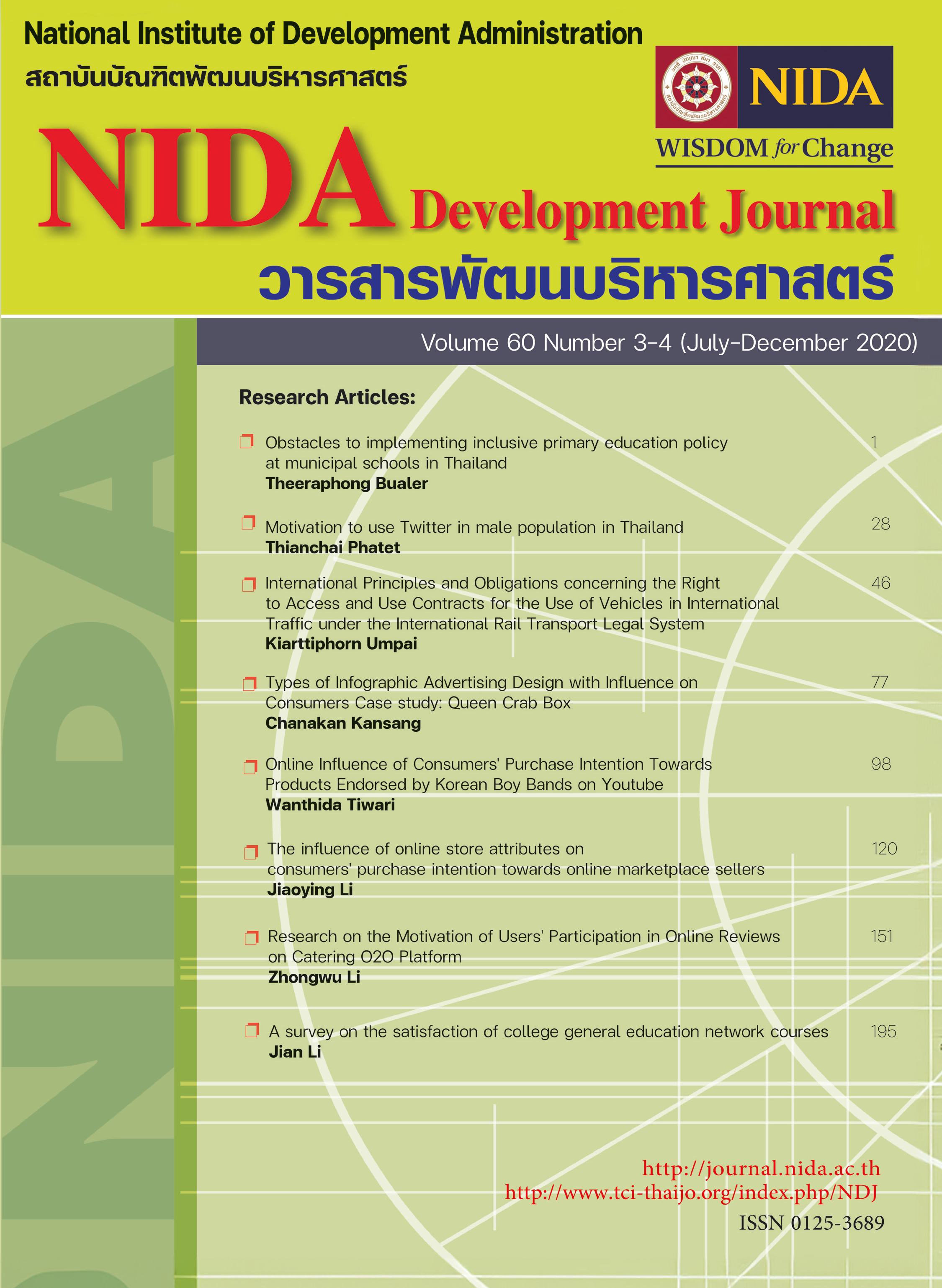Online Influence of Consumers’ Purchase Intention towards Products Endorsed by Korean Boy Bands on Youtube
Keywords:
K-Pop, Youtube Ads Format, Youtube Online Engagement , Product Involvement , Purchase IntentionAbstract
The objective of the study is to understand the influence of advertisement format and platform engagement on purchase intention for products endorsed by Korean boy bands on YouTube. The study was conducted with a quantitative approach from 408 respondents exposed to YouTube ads in 2022. The results show that advertising format, namely product placement (B= 0.267) has a positive influence on the purchase intention of the Thai audience alongside the action of clicking ‘Like’ (B = 0.108). Analysis through multiple regression shows a positive influence of the product placement variable on purchase intention over other advertisement formats available on YouTube. The results suggest the significance of in content product placement method aiming for more aiming the ‘Like’ metric of engagement for effective targeting for low involvement products.
References
Amos, C., Holmes, G., & Strutton, D. (2008). Exploring the relationship between celebrity endorser effects and advertising effectiveness. International Journal of Advertising, 27(2), 209–234. https://doi.org/10.1080/02650487.2008.11073052
AWOBAMISE, AO& JARRAR, Y (2018). "Celebrity Endorsement and Its Impact on Consumer Perception: A Study of Globacom Nigeria Limited."The Online Journal of Communication and Media, 4(2).
Boix-Romero, J., Vilaplana-Aparicio, M. J., & Ortiz, M. J. (2021). Product placement analysis in three Netflix original series . Retrieved July 14, 2022, from https://rua.ua.es/dspace/bitstream/10045/117232/2/Boix-Romero_etal_2021_ComSoc_eng.pdf
Booth, N., & Matic, J. A. (2011). Mapping and leveraging influencers in social media to shape corporate brand perceptions. Corporate Communications: An International Journal, 16(3), 184–191. https://doi.org/10.1108/13563281111156853
Brodie, R. J., Ilic, A., Juric, B., & Hollebeek, L. J. J. o. b. r. (2013). Consumer engagement in a virtual brand community: An exploratory analysis. 66(1), 105- 114.
Bu, K., & Kim, W. W. (2021). Is BTS different? shared episodes on SNS as a good indicator for celebrity endorsed ad effects. Asia Marketing Journal, 22(4). https://doi.org/10.53728/2765-6500.1366
Cai, L. A., Feng, R., & Breiter, D. (2004). Tourist Purchase Decision Involvement and Information Preferences. Journal of Vacation Marketing, 10(2), 138–148. https://doi.org/10.1177/135676670401000204
Chan, F. F., Petrovici, D., & Lowe, B. (2016). Antecedents of product placement effectiveness across cultures. International Marketing Review, 33(1), 5–24. https://doi.org/10.1108/imr-07-2014-0249
Dooley, B., & Lee, S.-hyun. (2020, October 14). BTS's Loyal Army of fans is the secret weapon behind a $4 billion valuation. The New York Times. Retrieved March 28, 2022, from https://www.nytimes.com/2020/10/14/business/bts-ipo.html
Duffett, R. (2020). The YouTube Marketing Communication Effect on Cognitive, Affective and Behavioural Attitudes among Generation Z Consumers. Sustainability, 12(12), 5075. https://doi.org/10.3390/su12125075
Harrison, H., Birks, M., Franklin, R., & Mills, J. (2017). Case study research: Foundations and methodological orientations. Forum Qualitative Sozialforschung / Forum: Qualitative Social Research. Retrieved July 15, 2022, from https://www.qualitativeresearch.net/index.php/fqs/article/view/2655
Hollebeek, L. D. (2011). Demystifying customer brand engagement: Exploring the loyalty nexus. Journal of Marketing Management, 27(7-8), 785–807. https://doi.org/10.1080/0267257x.2010.500132
Horáková, Z. The Channel of Influence? YouTube Advertising and the Hipster Phenomenon; Charles University: Prague, Czechia, 2018. [Google Scholar]
Jenkins, H. (2013). Textual poachers: Television fans and participatory culture. Routledge.
Jenol, A. (2020). K-pop Fans' Identity and The Meaning of Being a Fan. https://doi.org/10.13140/RG.2.2.26305.79202
Kawa, L. W., Rahmadiani, S. F., & -, S. K. (2013). Factors affecting consumer decisionmaking: A survey of young-adults on imported cosmetics in Jabodetabek, Indonesia. The SIJ Transactions on Advances in Space Research & Earth Exploration, 1(3), 17–22. https://doi.org/10.9756/sijasree/v1i3/0105420101
Kemp, S. (2022). Global Social Media Stats - DataReportal – global digital insights. DataReportal. Retrieved March 26, 2022, from https://datareportal.com/social-media-users
Khan, M. L. (2017). Social Media engagement: What motivates user participation and consumption on YouTube? Computers in Human Behavior, 66, 236–247. https://doi.org/10.1016/j.chb.2016.09.024
Kotler P. & Armstrong G. (2010), “Principles of Marketing”, New Jersey: Pearson Prentice Hall.
Lai, Y., Lai, C., & Chiang, H. (2015). Exploring the effects of online video advertising message display, product placement, and product involvement on advertising effectiveness. Int. J. Econ. Stat, 3, 117-127.
McIntyre, H. (2021, July 16). The buying power of BTS fans is, once again, unrivaled in the American music industry. Forbes. Retrieved March 28, 2022, from
Mirabi, V., Akbariyeh, H., & Tahmasebifard, H. (2015). A study of factors affecting on consumers purchase intention - Case Study: The agencies of Bono Brand Tile in Tehran. Journal of Multidisciplinary Engineering Science and Technology, 2(1), 267-273.
Pornpitakpan, C. (2004). The effect of celebrity endorsers' perceived credibility on product purchase intention. Journal of International Consumer Marketing, 16(2), 55–74.
https://doi.org/10.1300/j046v16n02_04
Schwemmer, C., & Ziewiecki, S. (2018). Social media sellout: The increasing role of product promotion on YouTube. Social Media+ Society, 4(3), 2056305118786720.
https://doi.org/10.1177/2F2056305118786720 [Crossref], [Web of Science ®], [Google Scholar]
Statista. (2022, January 28). Most viewed video in 24 Hours. Statista. Retrieved March
, 2022, from https://www.statista.com/statistics/478082/fastest-viral-videos-views-in-24hours/#:~:text=In%20May%202021%2C%20South%20Korean,million%20views%20back%20i n%202020.
Susarla, A., Oh, J.-H., & Tan, Y. (2012). Social networks and the diffusion of usergenerated content: Evidence from YouTube. Information Systems Research, 23(1), 23–41.
https://doi.org/10.1287/isre.1100.0339
Vingilisa, E.; Yildirim-Yeniera, Z.; Vingilis-Jaremkob, L.; Seeleya, J.; Wickensc, C.M.; Grushkaa, D.H.; Fleiterd, J. “Young male drivers’ perceptions of and experiences with YouTube videos of risky driving behaviors. Accid. Anal. Prev. 2018, 120, 46–54. [Google Scholar] [CrossRef]
Wesch, M. (1970, January 1). An anthropological introduction to YouTube. K. Retrieved
July 15, 2022, from https://krex.k-state.edu/dspace/handle/2097/6520
Westenberg, W. The Influence of YouTubers on Teenagers: A Descriptive Research about the Role YouTubers Play in the Life of Their Teenage Viewers; University of Twente: Enschede, The Netherlands, 2016. [Google Scholar]
Yüksel, H.F. (2016). FACTORS AFFECTING PURCHASE INTENTION IN YouTube VIDEOS. Bilgi Ekonomisi ve Yönetimi Dergisi 11(2), 33-47.
Downloads
Published
How to Cite
Issue
Section
License
Copyright (c) 2023 NIDA Development Journal

This work is licensed under a Creative Commons Attribution-NonCommercial-NoDerivatives 4.0 International License.





